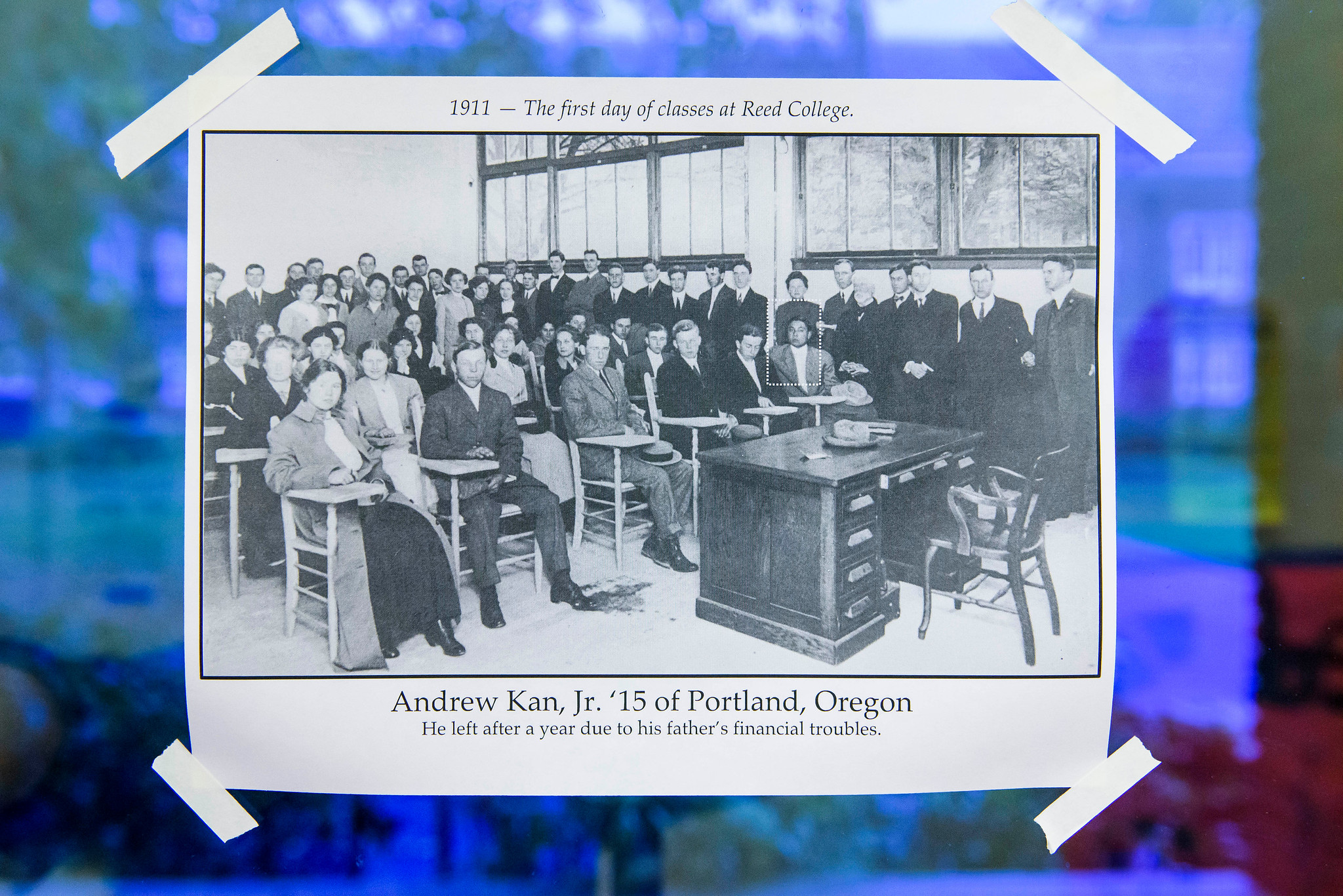Out of the Past
Archive project highlights students of color and activism in Olde Reed.
During Reunions last summer and for many months after, an understated art exhibit stretched the length of the Gray Center hallway. On dozens of pages taped to windows overlooking the quad were photocopies from old issues of the Griffin and Quest. If you stopped to look closer you’d notice that these were portraits, group photos, and newspaper clippings that included people of color who attended Reed from its very first days.
The project, Re-Racinating Olde Reed: An Archival Expedition in Search of Students of Color at Reed College, is the work of alea adigweme ’06, a multidisciplinary artist and scholar. Undertaken in honor of the 25th anniversary of the Multicultural Resource Center, alea spent hours digging through the Reed Digital Collections to find out more about students of color from Reed’s early years. Then she created an art installation to share her findings.
In a photo from 1911, taken on the first day of classes at Reed, alea identified Andrew Kan Jr. ’15 sitting at a desk in the front row. She learned he left after a year due to his father’s financial troubles.
Tamaki Fukuda ’24 appears on a page featuring the staff of the Griffin. In her annotation, alea asks whether Tamaki's influence as an editor of the Griffin was responsible for a notable change in format: there were no longer any racist advertisements as there had been in previous issues.
The exhibit comprises over 50 printed pages of archival materials. The photos include Inez Freeman ’48, whose ejection from a local restaurant sparked student activism against racism in the late ’40s; Kenneth Koe ’45, who pioneered the revolutionary treatment for depression, Zoloft; and Portland business and civic leader Bill Naito ’49, who revitalized downtown Portland. The exhibit also highlights many less well-known students of color, and includes accounts of student activism, such as the protest for a black studies program at Reed by the Black Student Union in the late ’60s.
alea did not approach the project with any hypothesis, but wanted, she says, to let the archives speak. The installation carries this sensibility with its restrained, yet incisive commentary. Thoughtful annotations raise questions and suggest lines of inquiry and attention. But much is presented without comment. What do we see? How do the archives speak to us? What narratives about Reed and student activism have we missed? Why?
“Spending so much time in the Reed Digital Collections I was consistently struck by the sheer number and variety of archival materials that reminded me of my own undergraduate experience or of Reedies I’ve known," alea said. "And really, I think this notion of the archive as imperfectly reflective gets at the heart of why it’s so easy to have, as some folks do, a reductive understanding of the history of students of color at Reed College that is predicated on their very erasure. Who benefits when students of color are disconnected from the lives and deeds of Reedies of color who have come before them?”
She wondered how her experience at Reed might have been different had she known more about students like Andrew Kan, Jr., Tamaki Fukuda, and the student activism of prior decades.
The pages of the exhibit hung for many months, and when classes started in the fall, they were soon accompanied by flyers advertising groups, events, rooms for rent, and visiting speakers, resulting in a collage of present and past.
“I spent such a lot of time thinking about this, looking at different ways this thing could exist, and function beyond a one-off project,” alea said. In January, she taught a Paideia class on doing archival research with Prof. Radhika Natarajan [history] and Reed’s special collections librarians Maria Cunningham and Laura Buchholz.
This fall, Maya Arigala ’20 and Mayaki Kimba ’20 will use a Social Justice Research Grant to do more archival work focused on the experiences of students of color at Reed. They will be collaborating with faculty, staff, alumni, and community members.
Tags: Alumni, Campus Life, Diversity/Equity/Inclusion, Reed History
